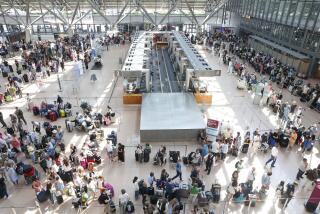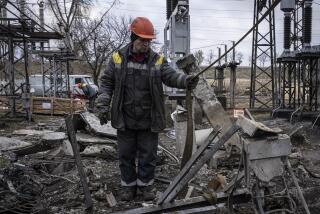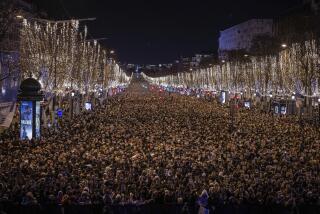Y2K: Who’s Ready, Who’s Not
- Share via
A look at Y2K readiness in the United States and around the world:
UNITED STATES
For the record:
12:00 a.m. Dec. 12, 1999 For the Record
Los Angeles Times Sunday December 12, 1999 Home Edition Part A Page 3 Food Desk 1 inches; 34 words Type of Material: Correction
Y2K--In a graphic on this page on Dec. 5, The Times gave the wrong date on which authorities fear a Russian religious sect, the Church of the Final Testament, may commit mass suicide. The correct date is Jan. 7, the birthday of the sect’s leader.
* BANKS
The Federal Reserve has set up a “special liquidity facility” to give banks loans in case of sudden demand for cash.
* ELECTRICAL GRIDS
No major disruptions are anticipated.
* HEALTH CARE
Many hospitals and doctors’ offices have been slow to make their laboratory and diagnostic equipment Y2K compliant, so the health care sector may face some disruptions in the new year, some surveys suggest.
* MILITARY
The Department of Defense doesn’t anticipate any major problems. Russian military officials will be at Peterson Air Force Base in Colorado. If Russian computer systems report a false nuclear attack, the Russians will be able to confirm that it is false.
* PHONES
Telephone service is expected to continue without interruption. Phone companies are, however, warning customers not to check their dial tone at midnight--if too many phones surge into use at one time, circuits could be tied up even if there are no technical problems.
* PUBLIC SAFETY
Although many 911 emergency response systems are behind with their fixes, the National Emergency Number Assn. expects them to be completed in time.
* SCHOOLS
Schools may encounter problems after the holiday break. Almost 40% of U.S. school districts and colleges have not adequately tested their facilities for the millennium computer bug, officials warned in late October.
* SUPPLIES
Stockpiling is not necessary, most experts say,
though some Americans may want to have a little extra money, a full tank of gas and extra food in case local stores hit snags.
* TERRORISM
The FBI warned in November that cults and racist fringe groups could be planning for scattered violence on New Year’s Day.
WORLDWIDE
* AIRLINES
Most airlines will be flying, although they are having to significantly reduce flights because Y2K fears are keeping many people from flying that night. Many longer international flights will be carrying extra fuel on New Year’s Eve.
* AMERICANS ABROAD
U.S. embassies and consulates around the world are scheduled to check in with State Department officials in the United States at 1 a.m. in their respective time zones, to make sure nothing is wrong. The United States is also creating special stockpiles of food and emergency supplies in various parts of the world in case there are problems.
* CULTS
Israeli authorities are worried about doomsday cults that may attempt acts of mass violence. Officials are particularly worried about incidents at the Dome of the Rock, one of Islam’s holiest places. Elsewhere, one alarming apocalyptic cult is Russia’s Church of the Final Testament, which is reported to have several thousand followers headquartered on a Siberian mountain. Russian authorities worry that they may commit mass suicide near the traditional Russian New Year’s Eve, Jan. 6.
* ELECTRICITY
Power around the world is not expected to suffer any serious disruptions on Jan. 1, partly because there will be less demand. Many industrial plants will be shut down for the rollover, and many utilities in less developed countries are able to switch to manual operations.
POTENTIAL TROUBLE SPOTS
* AFRICA
Across the continent, potential problems are likely to be contained since computerization is not widespread outside the capitals. Officials in South Africa say their country is ready.
* CHINA
Weapons and nuclear plants are ready, according to Chinese officials, although some Western analysts warn that the massive country could experience huge disruptions. Because China has only recently cultivated its technology industry, the government could fall back on traditional non-computerized modes of operation.
* EASTERN EUROPE
Former Iron Curtain nations are said to be woefully behind with their preparations, but use of older computer systems is not widespread. The State Department has cautioned Americans against traveling in Russia, Belarus, Moldova and Ukraine.
* INDONESIA
One of the biggest potential trouble spots. Indonesia has not had the resources in the last two years to update aging technology.
* ISRAEL
In addition to the influx of millions of foreigners to the Holy Land, Israeli authorities are worried about doomsday cults.
* ITALY
Italy got a late start on Y2K preparations, but officials now say they are ready. Some isolated power outages are possible. Any major disruptions in Rome would be exacerbated by the tens of thousands of foreign tourists expected for New Year’s Eve.
* JAPAN
Japan got off to a late start on Y2K but has done considerable work in recent months, and now officials think the country is ready. As a precaution, all trains will be stopped for a 15-minute period that overlaps midnight of Dec. 31. The government has suggested that residents stockpile at least two days’ worth of food.
* PARAGUAY
Analysts say the South American nation is very far behind in fixing the millennium bug, and the country’s Y2K coordinator fears significant disruptions in daily life.
* RUSSIA
The CIA warns that Russia, with 11 time zones and dwindling resources, may be at risk of breakdown. Citizens may have trouble with heat and food. Russian officials insist that the country’s vital systems will be ready. They are setting its electrical grid to manual control on Dec. 31 to prevent outages. Air traffic control may be switched to manual as well.
* UKRAINE
Many experts warn that the country’s fragile infrastructure could sustain heavy Y2K damage, although the government officially denies it.
* VENEZUELA
The public sector is said to be ill prepared for Y2K, and some experts are concerned about electricity brownouts from the state-owned power utility.
RISK RATINGS
Risks according to International Monitoring, a technology group. It says 10% of failures will occur Jan. 1, the rest in the days and weeks after.
Best Prepared
Better Prepared
Moderately prepared
Less prepared
Worst prepared
Inadequate information
*
Sources: Staff and wire reports, Times files, President’s Council on Year 2000 Conversion, Associated Press, International Monitoring
Compiled by JOHN JACKSON/Los Angeles Times
More to Read
Sign up for Essential California
The most important California stories and recommendations in your inbox every morning.
You may occasionally receive promotional content from the Los Angeles Times.










